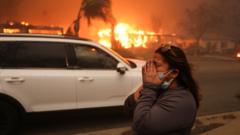Despite efforts to combat climate change, recent data reveals alarming increases in atmospheric carbon dioxide concentrations, now more than 50% higher than pre-industrial levels. The surge in CO2 levels is primarily driven by continued fossil fuel use, exacerbated by factors such as global wildfires and droughts limiting nature's capacity to absorb these emissions. As a result, 2024 has been reported as the hottest year on record, with annual average temperatures surpassing the critical limit of 1.5C above pre-industrial levels.
This unprecedented rise highlights the urgent need to take action against climate change. With last year's fossil fuel emissions peaking at new highs and natural carbon sinks—like forests and oceans—struggling to cope, scientists warn that we are veering dangerously off course from the objectives set during the 2015 Paris Agreement. Richard Betts from the Met Office emphasizes that the rapid increase in CO2 is "incompatible" with the international pledge to limit warming to 1.5C.
The situation has been further complicated by the natural oceanic phenomenon known as El Niño, which has skewed weather patterns and affected CO2 absorption rates. Preliminary data indicates an increase of nearly 3.6 parts per million in CO2 levels from 2023 to 2024, hitting a new high of over 424 ppm—the largest annual increase ever recorded since measurements began in 1958 at the Mauna Loa research station.
Additionally, ongoing environmental concerns, such as wildfires in unexpectedly affected areas and the compromised ability of vital carbon sinks like the Amazon rainforest, raise red flags for the long-term viability of CO2 mitigation strategies. The Met Office does predict a slight easing in CO2 concentration growth for 2025 due to shifting climate conditions, but warns that the overall trend remains alarmingly inconsistent with the 1.5C targets.
As we navigate these pivotal challenges, experts implore the global community to shift focus towards sustainable solutions and recommit to efforts that can stabilize climate conditions before it’s too late.
This unprecedented rise highlights the urgent need to take action against climate change. With last year's fossil fuel emissions peaking at new highs and natural carbon sinks—like forests and oceans—struggling to cope, scientists warn that we are veering dangerously off course from the objectives set during the 2015 Paris Agreement. Richard Betts from the Met Office emphasizes that the rapid increase in CO2 is "incompatible" with the international pledge to limit warming to 1.5C.
The situation has been further complicated by the natural oceanic phenomenon known as El Niño, which has skewed weather patterns and affected CO2 absorption rates. Preliminary data indicates an increase of nearly 3.6 parts per million in CO2 levels from 2023 to 2024, hitting a new high of over 424 ppm—the largest annual increase ever recorded since measurements began in 1958 at the Mauna Loa research station.
Additionally, ongoing environmental concerns, such as wildfires in unexpectedly affected areas and the compromised ability of vital carbon sinks like the Amazon rainforest, raise red flags for the long-term viability of CO2 mitigation strategies. The Met Office does predict a slight easing in CO2 concentration growth for 2025 due to shifting climate conditions, but warns that the overall trend remains alarmingly inconsistent with the 1.5C targets.
As we navigate these pivotal challenges, experts implore the global community to shift focus towards sustainable solutions and recommit to efforts that can stabilize climate conditions before it’s too late.





















